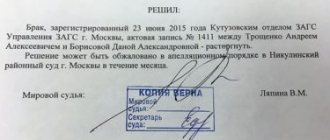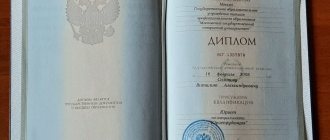1. The decision of the court of first instance, which resolves the case on its merits, is adopted in the name of the Russian Federation in the form of a court decision.
2. The court decision is made in a deliberation room, where only the judge considering the case or the judges who are members of the court in the case can be present. The presence of other persons in the deliberation room is not permitted.
3. The meeting of judges takes place in the manner prescribed by Article 15 of this Code. Judges cannot disclose opinions expressed during the meeting.
4. A judge who has a dissenting opinion on a decision has the right to express a dissenting opinion in writing within no more than five days from the date of the court’s decision. When expressing his dissenting opinion, the judge does not have the right to indicate in it information about the judgments that took place during the discussion and decision-making, about the position of individual judges who were members of the court, or in any other way reveal the secret of the meeting of judges. The judge's dissenting opinion is attached to the decision made.
Commentary to Art. 194 Code of Civil Procedure of the Russian Federation
1. The features of the decision are the following provisions.
1) A decision is a procedural act (document).
2) A procedural act issued on behalf of the state by the court of first instance in a court hearing.
According to Art. Art. 4, 5 of the Constitution of the Russian Federation, the sovereignty of the Russian Federation, consisting of republics, territories, regions, cities of federal significance, autonomous regions, autonomous districts, extends to its entire territory. Based on this, and also taking into account that issues of civil and civil procedural legislation are under the jurisdiction of the Russian Federation (clause “o” of Article 71 of the Constitution of the Russian Federation), all courts of the Russian Federation administering justice in civil cases on its territory, including military courts and magistrates make decisions in the name of the Russian Federation. ——————————— By analogy with the criminal procedural institute. See: Resolution of the Plenum of the Supreme Court of the Russian Federation of April 29, 1996 No. 1 “On the judicial verdict” // Collection of decisions of the Plenums of the Supreme Courts of the USSR and the RSFSR (Russian Federation) on criminal cases. 1997. P. 545.
3) The case is resolved on its merits by a court decision.
2. Courts should keep in mind that, due to the provisions set out in the commented article, only those decisions of the court of first instance are adopted in the form of a decision, by which the case is resolved on the merits, and the range of issues constituting the content of the decision is determined by Art. Art. 198, 204 - 207 Code of Civil Procedure of the Russian Federation.
3. Therefore, it is unacceptable to include in the operative part of the decision the court’s conclusions on that part of the claims for which a decision on the merits is not made (Articles 215, 216, 220 - 223 of the Code of Civil Procedure of the Russian Federation). These conclusions are presented in the form of determinations (Article 224 of the Code of Civil Procedure of the Russian Federation), which must be made separately from decisions. At the same time, it must be borne in mind that the inclusion of these conclusions in the decision in itself is not a significant violation of the rules of procedural law and does not entail its cancellation on this basis in the appeal, cassation and (or) supervisory procedures. ——————————— See: Resolution of the Plenum of the Supreme Court of the Russian Federation of December 19, 2003 N 23 “On the court decision” // Bulletin of the Supreme Court of the Russian Federation. 2004. N 2.
4. The value of the decision is predetermined by the content of these features. Only through the issuance of this procedural act, as well as an appellate decision, can the case be resolved on its merits.
5. It is through the issuance of a decision that the correct and timely consideration and resolution of civil cases is carried out in order to protect the violated or disputed rights, freedoms and legitimate interests of individuals and legal entities, as well as the rights and interests of the Russian Federation, constituent entities of the Russian Federation, municipalities, other persons, who are subjects of civil, labor or other legal relations, and, moreover, the tasks of strengthening the rule of law and order, preventing crime, and developing a respectful attitude towards the law and the court are resolved.
6. Judges make decisions according to their inner conviction, guided by the law and professional legal consciousness, in conditions that exclude outside influence on them. ——————————— By analogy with the interpretation of previously existing civil procedural rules. See: Resolution of the Plenum of the Supreme Court of the USSR of July 9, 1982 No. 7 “On the judicial decision” // Collection of decisions of the Plenums of the Supreme Courts of the USSR and the RSFSR (Russian Federation) on civil cases. 5th ed. M.: Spark, 1996. P. 103.
7. In the deliberation room, not only the decision is made, but also the corrections made to its text are discussed. Corrections to the decision must be stipulated and the reservations signed by all judges in the deliberation room before the decision is announced. Corrections that are not agreed upon and signed by the judges regarding significant circumstances (for example, the size of the satisfied claim) are grounds for a higher court to cancel the decision in whole or in the relevant part. ——————————— By analogy with the criminal procedural institute. See: Resolution of the Plenum of the Supreme Court of the Russian Federation of April 29, 1996 No. 1 “On the judicial verdict” // Collection of decisions of the Plenums of the Supreme Courts of the USSR and the RSFSR (Russian Federation) on criminal cases. 1997. pp. 545 - 546.
8. Even the chairman of the court cannot be present at a meeting of judges if he is not a member of this particular composition of the court.
9. Judges do not have the right to disclose judgments that took place during the meeting to anyone, even to the chairman of the court or the chairman (member of the court, representative of the Ministry of Justice of the Russian Federation, prosecutor) of a higher court.
10. See also commentary to Art. Art. 10, 15 Code of Civil Procedure of the Russian Federation.
1. The Supreme Court of the Russian Federation drew the attention of the courts to the fact that the decisions they make must be legal and justified and contain a complete, motivated and clearly stated response to the plaintiff’s demands and the defendant’s objections, except for court decisions in cases in which the defendant admitted the claim and recognition of the claim accepted by the court, as well as in cases in which the claim (application) was rejected due to the recognition of unjustified reasons for missing the statute of limitations or the deadline for filing a lawsuit.
2. Since, by virtue of Part 4 of the commented article, the court decision must indicate the law that guided the court, it is necessary to indicate in the reasoning part the substantive law applied by the court to these legal relations, and the procedural rules that guided the court.
The court should also consider:
a) decisions of the Constitutional Court of the Russian Federation on the interpretation of the provisions of the Constitution of the Russian Federation to be applied in this case, and on the recognition of the normative legal acts listed in paragraphs “a”, “b”, “c” of Part 2 and not complying with the Constitution of the Russian Federation in Part 4 of Art. 125 of the Constitution of the Russian Federation, on which the parties base their demands or objections;
b) decisions of the Plenum of the Supreme Court of the Russian Federation, adopted on the basis of Art. 126 of the Constitution of the Russian Federation and containing explanations of issues that have arisen in judicial practice when applying the norms of substantive or procedural law to be applied in this case;
c) decisions of the European Court of Human Rights, which provide an interpretation of the provisions of the Convention for the Protection of Human Rights and Fundamental Freedoms to be applied in this case.
3. Courts must observe the consistency in presenting the decision established by the commented article. The content of the claim must be reflected in its descriptive part in accordance with the statement of claim.
If the plaintiff changed the basis or subject of the claim, increased or decreased its size, or the defendant admitted the claim in whole or in part, this should also be indicated in the descriptive part of the decision.
The recognition by a party of the circumstances on which the other party bases its claims or objections (Part 2 of Article 68 of the Code of Civil Procedure of the Russian Federation) is indicated in the reasoning part of the decision simultaneously with the court’s conclusions on the establishment of these circumstances, if there are no provisions provided for in Part 3 of Art. 68 of the Code of Civil Procedure of the Russian Federation, the grounds on which the acceptance of recognition of circumstances is not allowed.
4. Based on the fact that the decision is an act of justice that finally resolves the case, its operative part must contain comprehensive conclusions arising from the factual circumstances established in the reasoning part. In this regard, it must clearly formulate what exactly the court ruled both on the initially stated claim and on the counterclaim, if it was stated (Article 138 of the Code of Civil Procedure of the Russian Federation), who, what specific actions and in whose favor should be carried out , for which of the parties the disputed right is recognized. The court must resolve other issues specified in the law so that the decision does not cause difficulties in execution (Part 5 of Article 198, Articles 204 - 207 of the Code of Civil Procedure of the Russian Federation). If the stated claims are denied in whole or in part, it is necessary to indicate exactly to whom, in relation to whom and what was denied.
In cases where the decision is subject to immediate execution or the court comes to the conclusion that this is necessary (Articles 210 - 212 of the Code of Civil Procedure of the Russian Federation), a corresponding indication must be made in the decision.
5. If the court finds that a disciplinary sanction was imposed in violation of the law, this conclusion must be motivated in the decision with reference to the specific provisions of the law that were violated.
6. If the claim for disputes arising from labor relations is satisfied, the court in the operative part of the decision must indicate that the administration is obliged to conclude an employment agreement (contract) with the employee from the first working day following the last day of validity of the fixed-term employment contract.
7. If, when considering a case on reinstatement at work, the court comes to the conclusion that misconduct actually occurred, but the dismissal was made without taking into account the above circumstances, the claim may be satisfied. However, in this case, the court does not have the right to replace dismissal with another penalty, since in accordance with Art. 192 of the Labor Code of the Russian Federation, imposing a disciplinary sanction on an employee is the responsibility of the employer.
8. The court must justify in its decision its conclusion about the amount of moral damage to be compensated.
9. When declaring a transaction invalid, the court must determine the specific measures necessary to bring the parties to their original position: who should take what specific actions and in whose favor, the return of funds, eviction. These issues cannot be resolved by presenting independent claims to the court, but must be resolved simultaneously with the recognition of contracts as invalid, also in order to eliminate the possibility of disputes during execution.
10. Since in claims for recognition the question of the existence or absence of a particular legal relationship or individual rights and obligations of the persons participating in the case is resolved, the court, when satisfying the claim, is obliged, if necessary, to indicate in the operative part of the decision the legal consequences that this entails recognition (for example, on the annulment of a marriage registration document if it is declared invalid).
11. The Code of Civil Procedure of the Russian Federation, establishing different procedures for the consideration of cases for certain types of proceedings (claims, special proceedings, proceedings in cases arising from public legal relations), provides for everyone a single form of completing the proceedings on the merits by making a decision. In this regard, courts should keep in mind that the requirements of the commented article on the procedure for presenting decisions are mandatory for all types of proceedings.
(Official version of Article 194 of the Code of Civil Procedure of the Russian Federation)
1. The decision of the court of first instance, which resolves the case on its merits, is adopted in the name of the Russian Federation in the form of a court decision.
2. The court decision is made in a deliberation room, where only the judge considering the case or the judges who are members of the court in the case can be present. The presence of other persons in the deliberation room is not permitted.
3. The meeting of judges takes place in the manner prescribed by Article 15 of this Code. Judges cannot disclose opinions expressed during the meeting.
4. A judge who has a dissenting opinion on a decision has the right to express a dissenting opinion in writing within no more than five days from the date of the court’s decision. When expressing his dissenting opinion, the judge does not have the right to indicate in it information about the judgments that took place during the discussion and decision-making, about the position of individual judges who were members of the court, or in any other way reveal the secret of the meeting of judges. The judge's dissenting opinion is attached to the decision made.
Article 194 of the Code of Civil Procedure of the Russian Federation regulates the procedure for making court decisions. In the article, the legislator explains what a court decision is. This is a type of order by which the trial court concludes the proceedings and renders a verdict on behalf of the state. There are three types of court orders. All of them are issued by the court on behalf of the Russian Federation.
Court decisions should be distinguished from determinations and orders. According to Article 224 of the Code of Civil Procedure of the Russian Federation, determinations are intended to resolve intermediate issues during the proceedings or in the process of preparing for them. The judge makes a ruling if he plans to postpone the hearing, replace the defendant, terminate the proceedings, and in other similar cases. The court of first instance may complete the proceedings by means of a ruling only in exceptional cases, which are specified in the commentary to Article 220 of the Code of Civil Procedure of the Russian Federation and.
Unlike a decision and determination, an order is not relevant to the judicial contest. The judge has the power to make an order without initiating legal proceedings in the case.
Having formulated the difference between a decision and other types of court decisions, the legislator explains the procedure for its adoption. He points out that judges have the right to make decisions only in the deliberation room. During the discussion, only the judges who heard the case may be present in the conference room. Violation of the secrecy of a court conference serves as a reason for canceling a court decision in accordance with.
Judges decide the case by open vote. The last to vote is the chairman of the court. None of the participants in the discussion has the right to abstain. If one of the judges does not agree with the majority opinion, he formulates a dissenting opinion. It is included in the case, but is not made public when the decision is announced.
The judges also make any corrections to the text of the decision made in the deliberation room. They negotiate and sign off on any correction before a decision is made. An amendment not signed by each participating judge serves as grounds for full or partial reversal of the decision in a higher court.
Since the decision ends the proceedings, the court must make one similar decision in each trial. But there are also interim decisions that the court has the right to make before the end of the proceedings.
In some circumstances, a decision may be made at a preliminary court hearing, which is held, in accordance with, in preparing the case for trial. At a preliminary court hearing, when it is established that the statute of limitations or the deadline for going to court has been missed without good reason, the judge makes a decision to reject the claim without examining other factual circumstances. This decision will have the same force as a decision made after a trial in an ordinary court session; the procedure for its adoption must meet the requirements of Article 194 of the Code of Civil Procedure of the Russian Federation.
Full text of Art. 194 Code of Civil Procedure of the Russian Federation with comments. New current edition with additions for 2021. Legal advice on Article 194 of the Code of Civil Procedure of the Russian Federation.
1. The decision of the court of first instance, which resolves the case on its merits, is adopted in the name of the Russian Federation in the form of a court decision. 2. The court decision is made in a deliberation room, where only the judge considering the case or the judges who are members of the court in the case can be present. The presence of other persons in the deliberation room is not permitted.
3. The meeting of judges takes place in the manner prescribed by Article 15 of this Code. Judges cannot disclose opinions expressed during the meeting.
4. A judge who has a dissenting opinion on a decision has the right to express a dissenting opinion in writing within no more than five days from the date of the court’s decision. When expressing his dissenting opinion, the judge does not have the right to indicate in it information about the judgments that took place during the discussion and decision-making, about the position of individual judges who were members of the court, or in any other way reveal the secret of the meeting of judges. The judge’s dissenting opinion is attached to the adopted decision. (Part additionally included on November 1, 2013 by Federal Law of October 21, 2013 N 272-FZ)
Commentary on Article 197 of the Code of Civil Procedure of the Russian Federation
1. A court decision is one of the most important procedural documents. Unlike a definition, it is always in writing. Article 197 of the Code of Civil Procedure clearly defines which of the judges and how the decision is stated, and by whom it must be signed. These rules also apply to decisions made by the magistrate.
The decision may be stated by the presiding judge or one of the judges at the direction of the presiding judge during a collegial consideration of the case. The text of the decision may be handwritten by the judge or typed on a computer or typewriter by a judge who is part of the court that made the decision.
2. The court decision is signed by a judge when he is considering a case alone or by all judges considering a case in a collegial composition of the court. None of the judges has the right to refuse to vote when making a decision (Part 1 of Article 15 of the Code of Civil Procedure), or to refuse to sign it (Part 2 of the commented article). A judge who does not agree with the decision of the majority is obliged to sign this decision, but can express in writing his dissenting opinion, which is attached to the case and is not announced when the court decision is announced (Part 2 of Article 15 of the Code of Civil Procedure).
In accordance with Part 2 of Art. 15 and part 1 art. 193 of the Civil Procedure Code, only a court decision signed by a judge alone or by all judges during a collegial hearing of a case is announced. Announcing an unsigned court decision is not allowed. Before the court decision is announced, it cannot be transferred anywhere (“go” outside the deliberation room), including for making copies, etc. The same rule also applies when announcing one operative part of the decision, which must be in writing, signed by the judge or judges and attached to the case (Article 193 of the Code of Civil Procedure). If the operative part of the decision was announced in the case, then it and the reasoned (full) decision must be signed by the same judges.
The judges participating in the case sign only the original decision. Copies of the decision issued to persons participating in the case may be certified by other judges, as well as by court staff.
The following violations of the principle of immediacy of civil proceedings will be unconditional grounds for the reversal of a court decision: if the decision is not signed by the judge indicated in the decision; if the decision was not made by the judge who considered the case (clauses 5, 6, part 2, article 364 of the Code of Civil Procedure).
The law specifically stipulates the rule on making corrections to a decision made by the court. All corrections in the decision must be certified by the signatures of all judges who accept and sign this decision. The law does not directly stipulate methods for making corrections to a court decision. We are talking about corrections to the prepared court decision, i.e. the text of which has already been signed by the judges or is to be signed. Regardless of the method chosen by the judge to correct the text of the court decision (crossing out and writing over the text, using the terms “corrected to believe”, etc.), the correction must comply with the general style of presentation of the decision and not violate the requirements for its certainty.
Commentary on Article 194 of the Code of Civil Procedure of the Russian Federation
1. When adopting a final decision that resolves the case on its merits, the court analyzes the evidence examined at the court hearing, evaluates it and, on the basis of this, draws conclusions about the factual circumstances relevant to the case, the nature of the disputed legal relations and their legal qualifications, as well as whether the claim can be satisfied. This procedural activity of the court as a body of state (judicial) power administering justice in civil cases is reflected in a written act called a decision. It is always accepted in the name of the Russian Federation, even if the case was resolved on the merits by a magistrate, who is a judge of general jurisdiction of the relevant constituent entity of the Russian Federation (Part 2 of Article 1 of the Federal Law of December 17, 1998 “On Magistrates in the Russian Federation”).
_______________ Northwestern Russian Federation. 1998. N 51. Art. 6270.
2. A prerequisite for the legality of a decision is the fulfillment of the requirements for its adoption in the deliberation room while maintaining secrecy. This is one of the guarantees of the implementation of the principle of independence of judges in the administration of justice and their subordination only to the Constitution of the Russian Federation and federal law.
Only judges who are members of the court during a collegial hearing of a case, or one judge if he is considering the case alone, can be in the deliberation room. Violation of the secrecy of the deliberation room when making a decision is an unconditional basis for the cancellation of a decision by a higher court.
The requirement for secrecy of the deliberation room is aimed at ensuring the independence of judges; it also implies a ban on the disclosure of information about the judgments expressed by judges during the deliberation. However, the mere disclosure of such information after the resolution of the case does not constitute grounds for canceling the decision, since this violation could not affect the will of the judges during the meeting on the issues discussed.
3. In a collegial hearing of a case, the judges of a given composition of the court have equal powers when making a decision. They resolve all issues discussed during the meeting by majority vote.
One of the guarantees of ensuring the equality of all judges when making a decision is the rule that imposes on the presiding officer the obligation to indicate his final position on the issue being resolved and to vote last. Otherwise, it could affect the outcome of the resolution of the case due to the greater authority of the presiding officer. This does not prevent the possibility of conducting a discussion on the issues discussed when making a decision, during which all judges, including the presiding judge, have the right to defend their own point of view, citing appropriate arguments in support of it.
4. When making a decision, all judges are obliged to form and indicate their personal position on the issues being resolved; none of the judges has the right to abstain from voting. If left in the minority, the judge has the right to express a dissenting opinion in writing, which is attached to the case materials.
Consultations and comments from lawyers on Article 194 of the Code of Civil Procedure of the Russian Federation
If you still have questions regarding Article 194 of the Code of Civil Procedure of the Russian Federation and you want to be sure of the relevance of the information provided, you can consult the lawyers of our website.
possible by phone or on the website. Initial consultations are held free of charge from 9:00 to 21:00 daily Moscow time. Questions received between 21:00 and 9:00 will be processed the next day.
Article 194. Adoption of a court decision
1. The decision of the court of first instance, which resolves the case on its merits, is adopted in the name of the Russian Federation in the form of a court decision.
2. The court decision is made in a deliberation room, where only the judge considering the case or the judges who are members of the court in the case can be present. The presence of other persons in the deliberation room is not permitted.
3. The meeting of judges takes place in the manner prescribed by Article 15 of this Code. Judges cannot disclose opinions expressed during the meeting.
Information about changes:
Federal Law No. 272-FZ of October 21, 2013 supplemented Article 194 of this Code with Part 4
4. A judge who has a dissenting opinion on a decision has the right to express a dissenting opinion in writing within no more than five days from the date of the court’s decision. When expressing his dissenting opinion, the judge does not have the right to indicate in it information about the judgments that took place during the discussion and decision-making, about the position of individual judges who were members of the court, or in any other way reveal the secret of the meeting of judges. The judge's dissenting opinion is attached to the decision made.
Commentary on Article 195 of the Code of Civil Procedure of the Russian Federation
1. The tasks of civil proceedings entail the requirements for a court decision as an act of a state body administering justice. The requirements that a court decision must satisfy are divided into two groups:
— requirements for the content of a court decision;
— requirements for the form of a court decision.
The requirements of the first group include legality, validity, completeness, categoricalness, unconditionality, and motivation. Article 195 of the Code of Civil Procedure of the Russian Federation particularly highlights the requirements of legality and validity of a court decision for the reason that the concept of legality covers both the requirement of validity and other requirements, since they are all provided for by law and their failure to comply means a violation of the law.
According to paragraph 2 of the Resolution of the Plenum of the Armed Forces of the Russian Federation dated December 19, 2003 N 23, a decision is legal in the case when it is made in strict compliance with the rules of procedural law and in full compliance with the rules of substantive law that are subject to application to a given legal relationship, or is based on the application in necessary cases, analogies of law or analogies of law (part 1 of article 1, part 3 of article 11 of the Code of Civil Procedure of the Russian Federation).
If there are contradictions between the rules of procedural or substantive law to be applied when considering and resolving a case, then the decision is legal if applied by the court in accordance with Part 2 of Art. 120 of the Constitution, Part 3 of Art. 5 FKZ “On the judicial system of the Russian Federation” and part 2 of Art. 11 of the Code of Civil Procedure of the Russian Federation, the norm that has the greatest legal force. When establishing contradictions between the rules of law to be applied when considering and resolving a case, the courts also need to take into account the explanations of the Plenum of the Armed Forces of the Russian Federation, given in Resolutions No. 8 of October 31, 1995 and No. 5 of October 10, 2003.
In accordance with paragraph 3 of the Resolution of the Plenum of December 19, 2003 N 23, a decision is justified when the facts relevant to the case are confirmed by evidence examined by the court that meets the requirements of the law on their relevance and admissibility, or by circumstances that do not require proof (Article 55 , 59 - 61, 67 Code of Civil Procedure of the Russian Federation), as well as when it contains exhaustive conclusions of the court arising from the established facts.
2. As a general rule, the court bases its decision only on the evidence that was examined at the court hearing and added to the case file.







